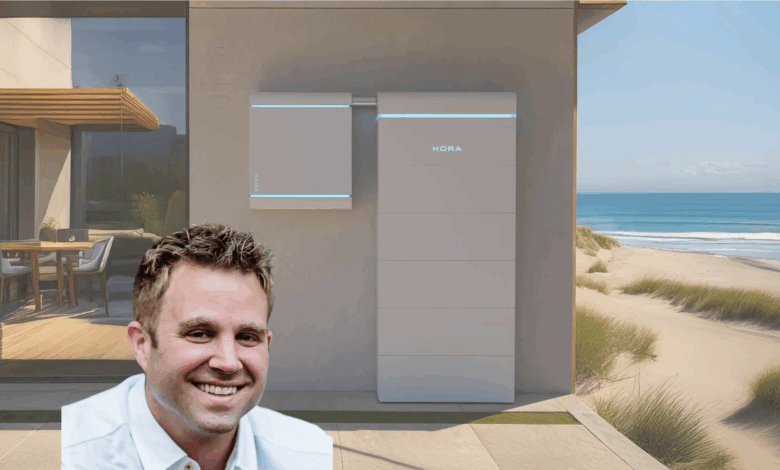
Today Kora Power launched from stealth to take a swing at one of home energy’s messiest problems: too many boxes, too many apps, and no easy way to make money off your own power. The company unveiled what it says is the nation’s first grid-tied 4-in-1 system, bundling a smart panel, modular batteries with a built-in hybrid inverter (“Powerblocks”), the Kora Home App, and Kora Energy Trading on a single platform. The company also raised $2.6 million in launch funding from Moneta Ventures and Growth Factory Ventures, with first customer shipments targeted for Q1 2026.
Kora’s pitch is simple. One box. One app. One bill-cutting AI model. And, crucially, a way to sell power back to the grid without playing utility phone tag. The company unveiled the product in a video today: https://www.youtube.com/watch?v=dTZzXW6Y0EI
The all-in-one bet
Most homeowners buy solar first, add a battery later, then tack on a smart panel, often from different brands with different apps. That creates setup friction, support gaps, and finger-pointing when something breaks. It can also limit control during outages and make it harder to time when you buy or sell electricity.
Kora’s system is designed to collapse that stack. The Kora Smart Panel gives circuit-level control so you can decide what stays on during an outage without installing extra sub-panels. The Powerblocks handle storage and inversion in one unit. The Kora app coordinates the whole flow: shift loads to cheaper hours, store when rates are low, and prioritize solar.
The company says the system scales to ~112 kWh of storage, well beyond a single-battery setup, and supports up to 91.2 kW of solar input to reduce clipping on larger arrays. Enclosures are NEMA 4X outdoor-rated, with temperature-controlled batteries that operate down to –25°C. A sub-20 ms UPS-style switchover aims to keep critical circuits online during blackouts. Noise is rated at ~35 dB. The Founders Edition carries a 12.5-year warranty across major components.
Trading electrons, not just storing them
The headline feature is Kora Energy Trading, which plugs homes into wholesale power markets through Kora’s virtual power plant (VPP). The company says its AI models predict when electricity will be cheapest and most expensive, charge or discharge accordingly, and automatically bid excess energy into the market where allowed. Kora claims early users have cut $1,500 monthly bills to zero in high-rate months, and some even made money during peaks.
Why now? FERC Order 2222 opened the door for distributed resources, like home batteries aggregated by a VPP, to participate in wholesale markets. Adoption varies by region, and actual earnings depend on local rules, interconnection, and market prices. But the direction of travel is clear: homes that can shift and trade power will have more ways to save.
Founders Edition reservations include lifetime access to Energy Trading. Kora is taking $100 refundable deposits and says early customers will be “grandfathered” into free trading for life.
Proven founder bringing the industry into the AI age
Kora was created by 3x founder Greg Connoly who most recently founded and scaled Trifecta into a $100M ARR food delivery company. He has several other startups under his belt and is widely respected as a leader in DTC, something he hopes to achieve with Kora.
“Before founding Kora, I tried several of the leading home energy systems. The user experience was poor, the equipment was expensive, and the functionality was limited,” says Greg Connoly, Kora’s founder and CEO. “We built Kora to bring the industry into the AI age with one system that gives homeowners real control, reliable backup, and lower bills automatically from day one.”
Investors are betting that a tighter stack plus market access will resonate. “We invested in Kora because they’re not just building smarter hardware,” says Jeff Olyniec, partner at Moneta Ventures. “They’re reinventing how homes and the grid interact, unlocking new opportunities in energy independence and resilience.”
Sacramento roots, manufacturing focus
Kora is headquartered in Rancho Cordova, a suburb of Sacramento that’s courting hardware and chip-adjacent companies. “This new company will bring research and development, innovative technology, and quality engineering jobs to our community and the greater region,” says Rancho Cordova Mayor Siri Pulipati. The team includes engineers from Apple, Sonnen, and IBM.
What to watch
There are real execution questions. Regulatory patchwork matters: FERC 2222 is federal, but local implementation and utility interconnection rules can slow VPP rollouts. Installation complexity is non-trivial for any whole-home system. And while Kora points to competitive pricing and a large per-home capacity, buyers will compare it to entrenched options from Tesla, Enphase, Generac, and Sonnen, many of which support multi-battery stacks and have large installer networks.
Kora’s counter is the single-platform experience and the potential upside from trading. If Energy Trading delivers reliable savings, and if homeowners value one vendor, one app, and circuit-level control—the package could stand out.
The bottom line
Kora is not just selling a big battery. It’s selling a household energy desk that buys low, sells high, and keeps the lights on when the grid stumbles. If the company hits its Q1 2026 shipping target and clears local market hurdles, the value prop is straightforward: fewer boxes, fewer apps, more control—and a shot at turning your home into a revenue-generating grid asset.
Availability: Founders Edition reservations are open now with a $100 refundable deposit and lifetime Energy Trading access for early adopters at: https://korapower.com/products/founders-edition



